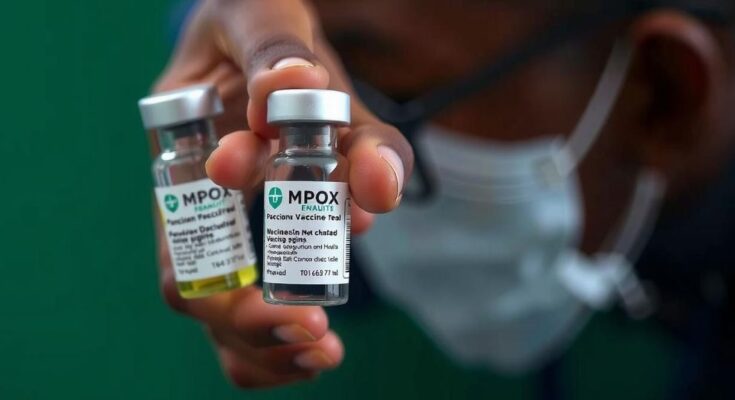Vaccination against mpox for adults in the DRC commenced, but critical doses for children are delayed due to liability negotiations. Japan’s pledged donation of LC16m8 vaccines has faced hurdles linked to legal responsibilities, highlighting the inadequacies in addressing liability during health emergencies. Experts stress the need for pre-established compensation systems to facilitate swift vaccine distribution, particularly for vulnerable populations.
In recent developments related to the vaccination against mpox in the Democratic Republic of Congo (DRC), adults began receiving vaccinations this week; however, children remain unvaccinated due to a delay stemming from a legal issue concerning liability. Japan’s commitment to donating three million doses of the LC16m8 vaccine, specifically effective for children, had been tarnished by negotiations over who holds liability for unexpected vaccine side effects.
The DRC’s health officials have reportedly resolved this issue, but it has highlighted the pressing need for a more systematic approach to expedite health responses, particularly in impoverished nations. The fear of bearing responsibility for potential claims deters governmental action, as seen in past vaccine programs during the COVID-19 pandemic. DRC Health Minister Samuel Roger Kamba Mulamba stated that the contract negotiations required both parties to assume responsibility to ensure mutual accountability in case of adverse effects.
Japan’s government has indicated that there is currently no liability dispute while maintaining that discussions regarding the vaccine delivery are ongoing. The LC16m8 vaccine, which received ’emergency use’ clearance from the World Health Organization, requires specialized administration techniques, potentially complicating its deployment in vaccination campaigns. Health professionals in Congo anticipate that these vaccines will be crucial, especially as children constitute a significant proportion of the fatalities from mpox this year. Despite the urgency, the effective mobilization of this humanitarian aid remains uncertain, as improper planning could hinder its impact.
Moreover, the current reliance on a different vaccine for adults, developed by Bavarian Nordic, has stymied fast vaccination rollouts despite substantial pledges and deliveries. Observations reveal that various communities within the DRC might lack awareness of the ongoing vaccination efforts, exacerbating the health crisis. Officials emphasize the necessity for swift delivery and effective implementation of the Japanese vaccine donation, as delays could have severe repercussions for public health.
Mpox, formerly known as monkeypox, has emerged as a critical public health concern in Africa, with rising infection and mortality rates, particularly among children. The onset of effective vaccination campaigns has been plagued by logistical and legal hurdles, often delayed by the prerequisites of liability agreements between donor and receiving nations. Japan’s contribution to the DRC is seen as a pivotal move, given its approval for pediatric use, thus underscoring the need for streamlined negotiation processes in global health initiatives to support vulnerable populations effectively.
In conclusion, the vaccination efforts against mpox in the DRC have been significantly impeded by legal discussions regarding liability for vaccine side effects, particularly affecting the delivery of crucial pediatric vaccines. While Japan’s donation represents a considerable step in combating the disease, the necessity for a robust framework to mitigate liability concerns in emergency health responses remains vital. It is imperative for immediate action and effective stratification in immunization efforts to safeguard the most affected demographics, especially children.
Original Source: www.usnews.com




